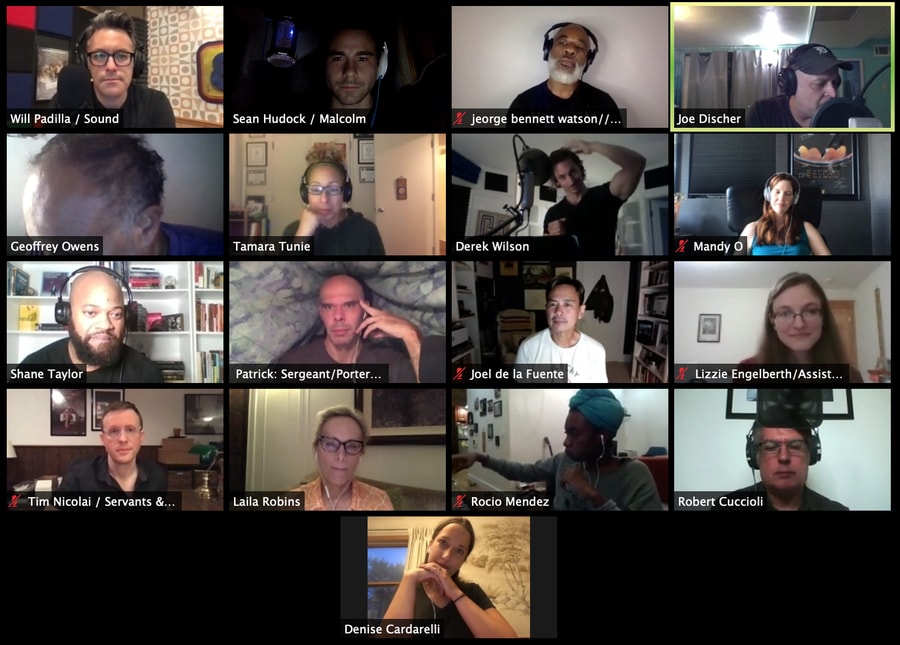Something a little wicked this way comes just in time for Halloween, as producer Sean Hudock (he/him) and director Joseph Discher (he/him) have put together Macbeth: A Surround Sound Experiment, an audio version of the Shakespearean play that uses a 3-dimensional soundscape by Will Padilla (he/him) to put listeners aurally into the middle of all the action. After months of lamenting work that was canceled due to the pandemic, Hudock turned his attention to Macbeth, which he said he found “eerily relevant,” and leaped at the chance to help others in the theatre community by creating this three-night only production, with audio streaming on demand Oct. 30-Nov. 1, which benefits the Actors Fund.
“We really had to find a reason and a purpose for telling the story beyond just wanting to do something,” Hudock said. “The first step was knowing that we were going to try and raise funds for people who need it. The second was to see if we could explore a medium that is pretty hot right now.”
In addition to the ample number of theatrical productions adapted or created for Zoom and to be seen virtually, many theatres are also exploring the options afforded by audio dramas. Audible has a library of plays available to listen to, which will include Williamstown Theatre Festival’s 2020 season starting in December; Steppenwolf Theatre Company produced an audio version of Arthur Miller’s The American Clock, starring many of its famed company members; and many theatres have already announced plans to use a radio drama format to produce their annual runs of A Christmas Carol.

“The audio drama is a terrific form because you don’t necessarily have to go to partake,” Discher said. “You can have a very personal, private experience by listening and connecting with an audio play. Even if we weren’t experiencing COVID, this is a genre that should be re-embraced.”
In fact, it was two of these productions that inspired Hudock and Discher to undertake this unique retelling of the Scottish Play. For Discher, it was The Public’s radio drama production of Richard II. For Hudock, it was Amphibian Stage’s audio production of The True History of the Tragic Life & Triumphant Death of Julia Pastrana, the Ugliest Woman in the World, by Shaun Prendergast, a play originally performed entirely in the dark. Over the summer, as the two sat socially distanced by a bonfire, they realized they had the same thought about what would make an ideal audio play.
“The first thing that popped into my head was Macbeth, because it’s such a psychological play,” Discher said. “It often gets a lot of spectacle and blood added to it, but really it’s kind of an intimate chamber piece. It’s kind of a psychological thriller, because it’s really about the choices that two people make that lead them to do some terrible things, and the spiraling descent from guilt to paranoia into madness. At its core, this is a story about ambition, unchecked immorality.”
Leading up to a crucial election, Discher and Hudock saw clear parallels to the current political climate. In thinking about the political relevance of the play, Discher referenced a line from Lady Macduff in Act 4, Scene 2: “But I remember now I am in this earthly world; where to do harm is often laudable, to do good sometime accounted dangerous folly.”
With the political climate lining up with the right medium and the first Halloween full moon since 2001, it seemed like the perfect opportunity to produce a play featuring witches, a ghost, and a deadly power struggle. Most importantly, however, producing Macbeth gives both audience and artists a chance to approach Shakespeare’s text in a new light.

“So much of what Shakspeare is about is the language and poetry,” Hudock said. “In Macbeth, it’s a play that relies so much on the horrific imagery, the descriptions of people going through this anguish and pain and torment. We said, all right, well, this might be a good audio opportunity to explore.”
To do so, Hudock brought together a cast featuring Future Man’s Derek Wilson as Macbeth and Better Call Saul’s Tamara Tunie as Lady Macbeth. The challenge Discher then faced as director was rehearsing and recording the production in two-hour stretches over the course of nearly two weeks. With a production that is essentially a benefit reading, and the audio release limited to Halloween weekend, Discher had just a total of 24 hours to get what he and sound designer Padilla needed.

“What you don’t have as much time for is that gestation period,” said Discher, “where you work on something, you discuss it, and then you go away and work on other scenes, and you come back to that scene and some things occur to you. You’ve really got to make a choice and commit right there when you’re doing it for audio.”
The goal of the production was to create something of an immersive event, one that asks the listener to strip away the distractions of the outside world for 90 minutes and sit in the dark, perhaps with a candle and a drink of choice, and let Padilla and Discher create the world of the story of the Macbeths inside of the audience’s imagination.
“Most folks might think of radio plays that have been done for years now,” Padilla said. “But for me, those still feel somewhat two-dimensional, that the performers are in front of you like it would be in the theatre. What we’re trying to do is make it more that you’re actually in the room, where people will be whispering in your ear and crossing in front of you.”
To accomplish this, Padilla said he worked with Discher as if the production were going to be onstage, talking about blocking characters relative to where a stationary listener would be located. While Discher would choose the takes he liked, Padilla would then use those takes and post-recording editing to craft an environment that places the audience in the room as an unseen eavesdropper.
With all of the actors recording safely from their own homes and rehearsing over Zoom, the sound quality Padilla was able to achieve depended heavily on the equipment the actors had at their disposal. Still, despite working with variations in microphone quality and the general background sounds of the houses and rooms where the actors recorded, Padilla said that as he was bringing together the soundscape, he found moments that even made him uncomfortable, as if he were overhearing conversations not meant for his ears.
The result, Hudock explained, is a production of Macbeth that invites audiences deep into the world of Macbeth, providing a level of intimacy perhaps even deeper than what television, movies, or even theatre can provide. After all, once headphones are put on and lights turned out, there’s very little space between the voices of characters spiraling into madness and the deepest recesses of a listener’s brain. In fact, Hudock explained, some of the soliloquies featured in Macbeth, which rank among the most memorable and affecting in all of Shakespeare, may even begin to feel like your own thoughts.
Wait—is that a dagger I see before me?
Jerald Raymond Pierce (he/him) is associate editor at American Theatre. jpierce@tcg.org


